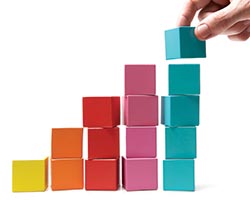Observation
Blocks and Puzzles May Help Children Learn Spatial Skills
 Children who play frequently with puzzles, blocks, and board games tend to have better spatial reasoning abilities than those who don’t, according to data from a nationally representative study published in Psychological Science. “Our findings show that spatial play specifically is related to children’s spatial reasoning skills,” says psychological scientist and lead researcher Jamie Jirout of Rhodes College.
Children who play frequently with puzzles, blocks, and board games tend to have better spatial reasoning abilities than those who don’t, according to data from a nationally representative study published in Psychological Science. “Our findings show that spatial play specifically is related to children’s spatial reasoning skills,” says psychological scientist and lead researcher Jamie Jirout of Rhodes College.
Although previous research indicated that spatial play activities might foster children’s spatial reasoning, relevant data from a large and diverse sample were lacking, says Jirout. When the Wechsler Preschool and Primary Scale of Intelligence (WPPSI), a commonly used test of cognitive ability, was revised and standardized, it provided Jirout and her coauthor Nora Newcombe, an APS William James Fellow at Temple University, with an opportunity to study children’s spatial play and spatial thinking.
Jirout and Newcombe analyzed data from 847 children, ages 4 to 7, who had taken the revised WPPSI, which included measures of cognitive skills that contribute to general intelligence. The children’s spatial ability was specifically measured via the commonly used Block Design subtest of the WPPSI, in which children are asked to reproduce specific 2-D designs using cubes that have red, white, and half-red/half-white faces. The researchers also examined survey data from parents about the children’s play behavior and joint parent–child activities.
The data revealed that family socioeconomic status, gender, and general intelligence scores were all associated with children’s performance on the block-design task. Children from the low-socioeconomic status group tended to have lower block-design scores compared with children from either the middle- or high-socioeconomic status groups. And boys tended to have higher block-design scores than did girls, though only after several other cognitive abilities, such as vocabulary, working memory, and processing speed were taken into account.
How often children played with certain toys was also tied to their spatial reasoning skills. Children who played with puzzles, blocks, and board games often (more than six times per week) had higher block-design scores than did children who played with them sometimes (three to five times per week), or rarely/never.
The researchers argue that targeting children’s spatial play may be one possible intervention tool for improving their spatial ability.




APS regularly opens certain online articles for discussion on our website. Effective February 2021, you must be a logged-in APS member to post comments. By posting a comment, you agree to our Community Guidelines and the display of your profile information, including your name and affiliation. Any opinions, findings, conclusions, or recommendations present in article comments are those of the writers and do not necessarily reflect the views of APS or the article’s author. For more information, please see our Community Guidelines.
Please login with your APS account to comment.